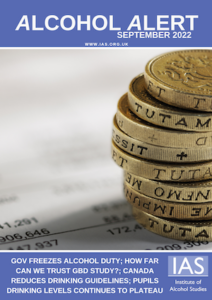In this month’s alert
How far can we trust the latest Global Burden of Disease study?
Podcast feature
In the summer, the Global Burden of Disease (GBD) group published a study that looked at alcohol consumption and harm, and suggested older people may benefit from drinking, while people under 40 should not drink.
This conclusion was lambasted by a number of alcohol researchers, including Colin Angus in an IAS blog and Professor Tim Stockwell in a Movendi blog, who criticised the study’s analysis and the data the conclusions were based on.
In our podcast we spoke to Professor Stockwell about the major issues of the study, including:
- Why the study has reported 1 million fewer alcohol deaths compared to its 2018 publication, despite no fall in global alcohol consumption
- How various biases throw off studies and suggest health benefits of alcohol
- Whether we should now distrust the GBD group
- The difficulties of understanding risk
Government’s freezes on alcohol duty will cost £8 billion in total
On Friday 23 September the UK Government published a ‘mini-budget’, which aimed to encourage economic growth by cutting various taxes and introducing reforms.
One of the measures announced was the freezing of alcohol duty for the next year due to “current economic pressures”. This makes it the tenth year out of eleven where duties have been either cut or frozen, instead of rising by the Retail Price Index (RPI).
The freeze of alcohol duty will cost the Treasury £600 million over the year and save drinkers approximately 7p on a pint and 38p on a bottle of wine. However, prices are still likely to increase, with companies battling rises in costs of raw materials and energy. Cumulatively, cuts and freezes over the past eleven years will have cost the Treasury around £8 billion.
Further, duty freezes are disproportionately better for the off-trade as duty makes up more of the cost of off-trade products. This leads to an increased price gap between on and off-trade products, as shown by health economist Colin Angus. He shows duty freezes therefore do little to support the hospitality sector:
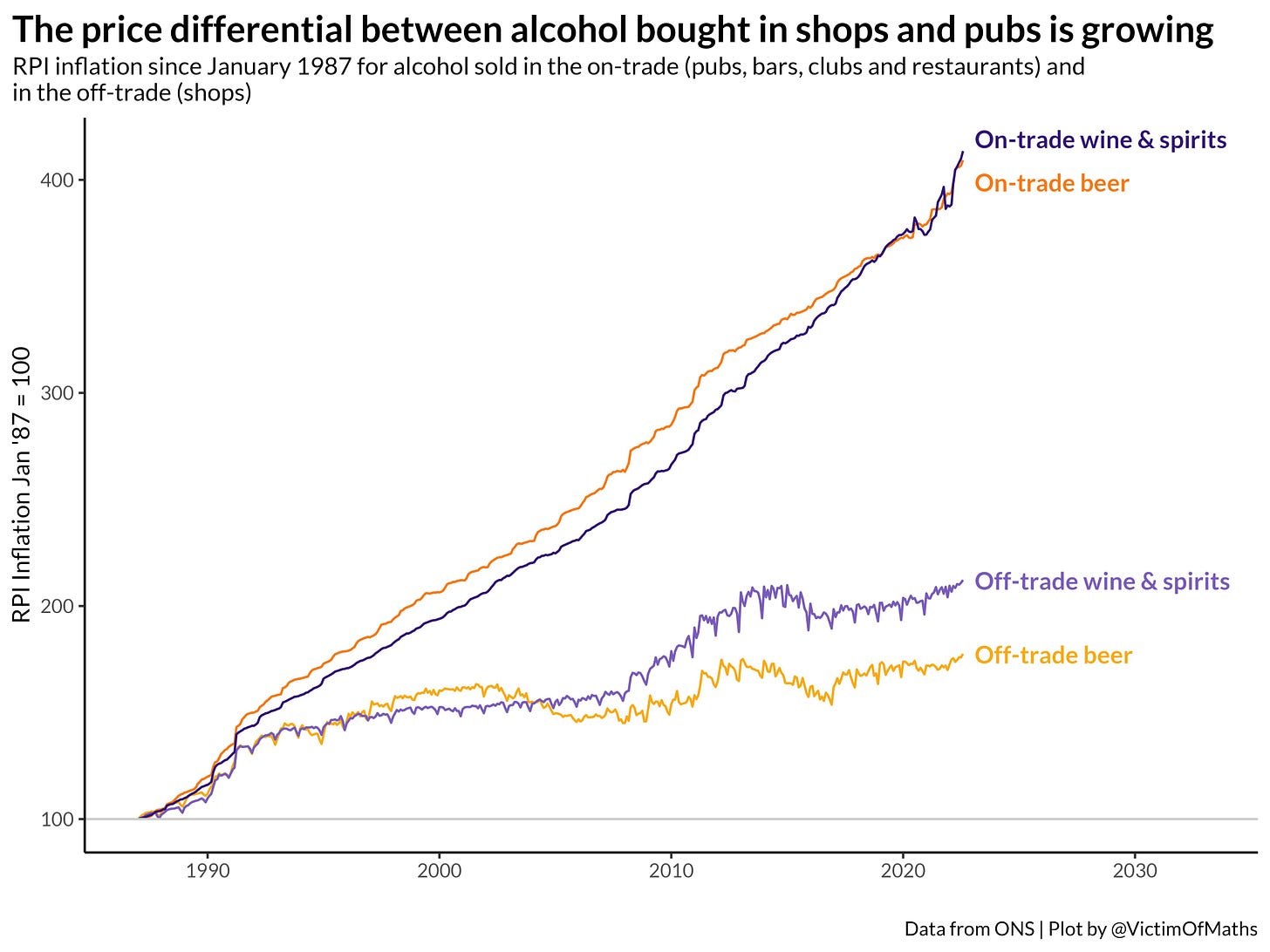
IAS’ interim chief executive Dr Alison Giles responded to the freeze:
“It is disappointing that the chancellor has frozen alcohol duty again in today’s mini-Budget.
“This means there is less revenue in real terms at a time when the NHS is in crisis, deaths from alcohol are at record highs, inequalities have grown, and alcohol harm is projected to worsen further.
“This decision calls into question Thérèse Coffey’s commitments yesterday to prevention and to supporting our health and social care services as they continue to struggle with the consequences of cheap alcohol.”
Colin Angus wrote on Twitter that the freeze is unsurprising, considering that RPI stands at 12.3% and that “on the face of it this seems like a very bad thing – effectively a 12.3% real terms cut in alcohol taxation”.
Angus also points out that the rise in the cost of living is not being accompanied by a comparable rise in wages, so therefore the reduction in people’s disposable income will effectively reduce the affordability of alcohol. He concluded that:
“So overall, cancelling the RPI increase in alcohol duties seems like a pretty bad thing for public health, but it’s probably not quite as bad as the 12.3% figure makes it seem.”
At the same time, the Government also published a policy paper on the alcohol duty review alongside its response to the latest duty review consultation. The new system aims to simplify alcohol duty and tax all alcohol on the basis of strength. The system will come in on 01 August 2023, with some exceptions for wine until 01 February 2025. IAS will be reviewing the response in detail over the coming weeks.
Alcohol and gambling industries use the same tactics to shape narrative of harms
A new study by Saloni Bhuptani for the Institute of Alcohol Studies shows that the alcohol and gambling industries use the same arguments and framings to shape the narrative around the harms caused by their products, and the solutions to those harms.
The study analysed alcohol and gambling industry responses to two House of Lords inquiries, which were gathering information about successes and failures of the Alcohol and Gambling Acts.
The responses were analysed for framing of arguments and strategies used by each industry, looking at how both industries framed the problem and solutions.
Both industries used similar framings:
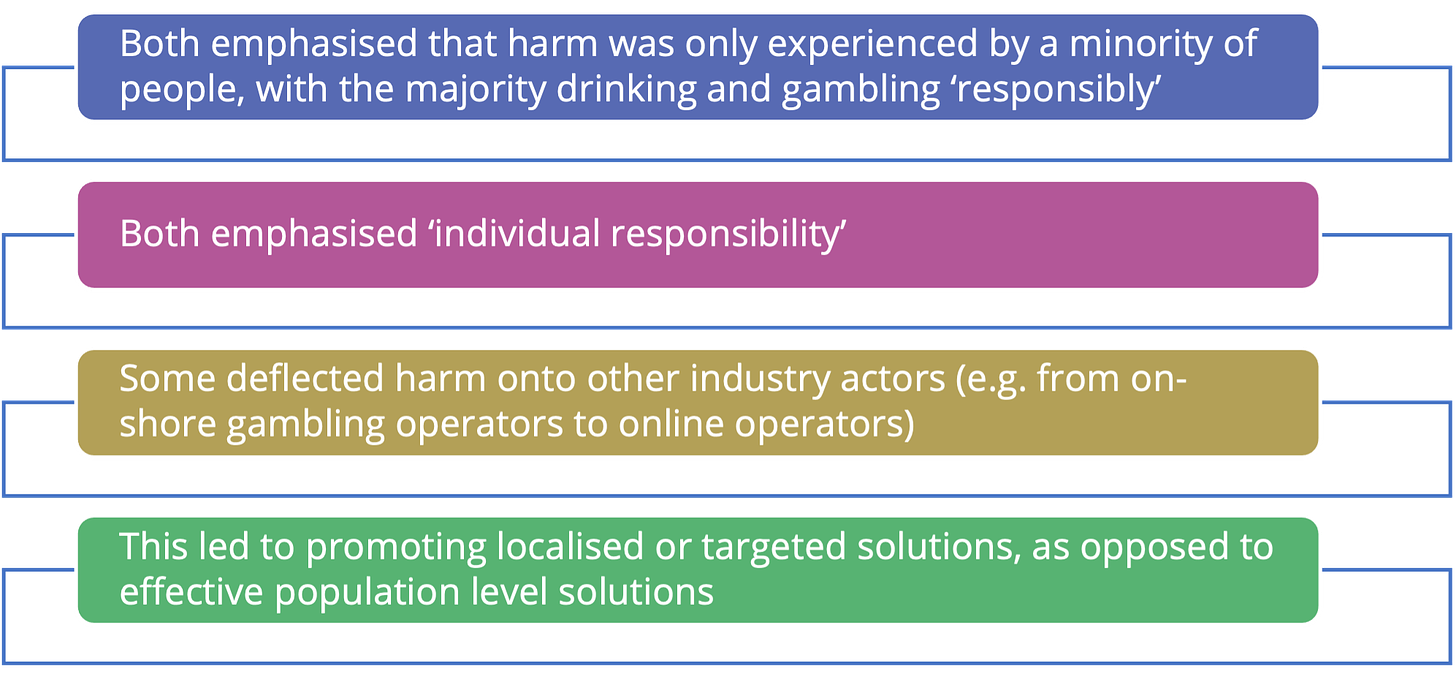
Saloni Bhuptani, said:
“Our study supports calls to move away from framing the problem of alcohol and gambling harms as one of ‘individual responsibility’, experienced by only a minority.
“These findings highlight the importance of policy makers being aware of these strategies to avoid undue industry influence on policy decisions.”
To catch up on the launch webinar, please watch the video below or on our YouTube channel here.
Canada reduces its drinking guidelines
The low-risk drinking guidelines in Canada have been reduced, due to newer evidence of the cancer risks of alcohol consumption and diminishing evidence of any protective effect.
The Canadian Centre on Substance Use and Addiction (CCSA) reviewed over 5,000 peer reviewed studies in order to publish their report: Update of Canada’s Low-Risk Alcohol Drinking Guidelines: Final Report for Public Consultation.
The report states that, above two standard drinks a week, a healthy person is at moderate risk of alcohol harm. Above six standard drinks, a person is at increasingly high risk of harm. In Canada a standard drink contains almost 14g of pure alcohol, compared to 8g in a UK unit. Therefore, six standard drinks equates to 10.5 UK units.
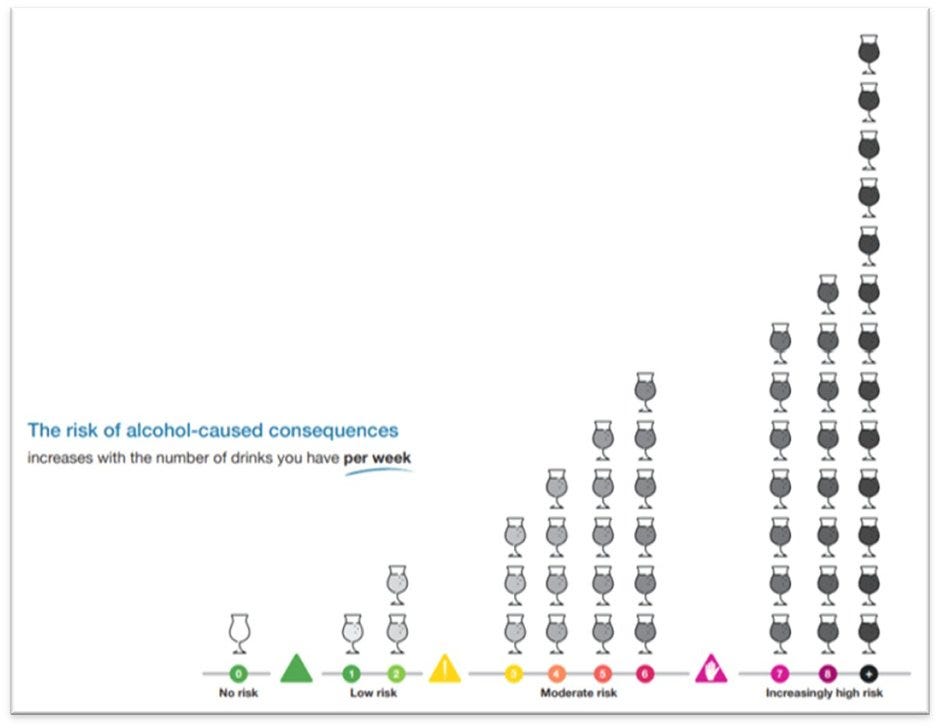
In a Twitter thread, Professor John Holmes of the University of Sheffield explained the above graphic which is found in the report:
“Essentially this says:
“Drinking more than two Canadian standard drinks per week equates to a >1 in 1,000 lifetime risk of dying due to alcohol.
“Drinking more than six Canadian standard drinks per week equates to a >1 in 100 lifetime risk of dying due to alcohol.”
The study authors write that:
“For many years, the commonly held belief that drinking in moderation offered protection against heart disease has been widely publicized. Research in the last decade is more nuanced with the most recent and highest quality systematic reviews showing that drinking a little alcohol neither decreases nor increases the risk of heart disease.
“At higher levels of use, alcohol is a risk factor for most types of cardiovascular disease, including coronary artery disease and heart attacks, heart failure, high blood pressure, atrial fibrillation and stroke.”
Professor Tim Stockwell, who was involved in the study, said in an article that the review “identified much weaker evidence than before for the hypothesis that low doses of alcohol can protect against heart disease”. He said there is still a lot of work to be done to determine the acceptable level of risk of alcohol for most people.
English public health teams want a public health licensing objective
A new study by the University of Stirling interviewed UK public health teams about their views on the actual and possible impact of a public health licensing objective in their day-to-day work.
Legislation introduced in 2003 and 2005 means that alcohol licenses should be approved unless they contravene licensing objectives, such as prevention of crime and disorder, and the protection of children from harm. In Scotland there is a specific licensing objective of ‘protecting and improving public health’, whereas in England and Wales there is not.
The Stirling study highlighted some key similarities and differences observed and experienced by public health teams across England and Scotland:
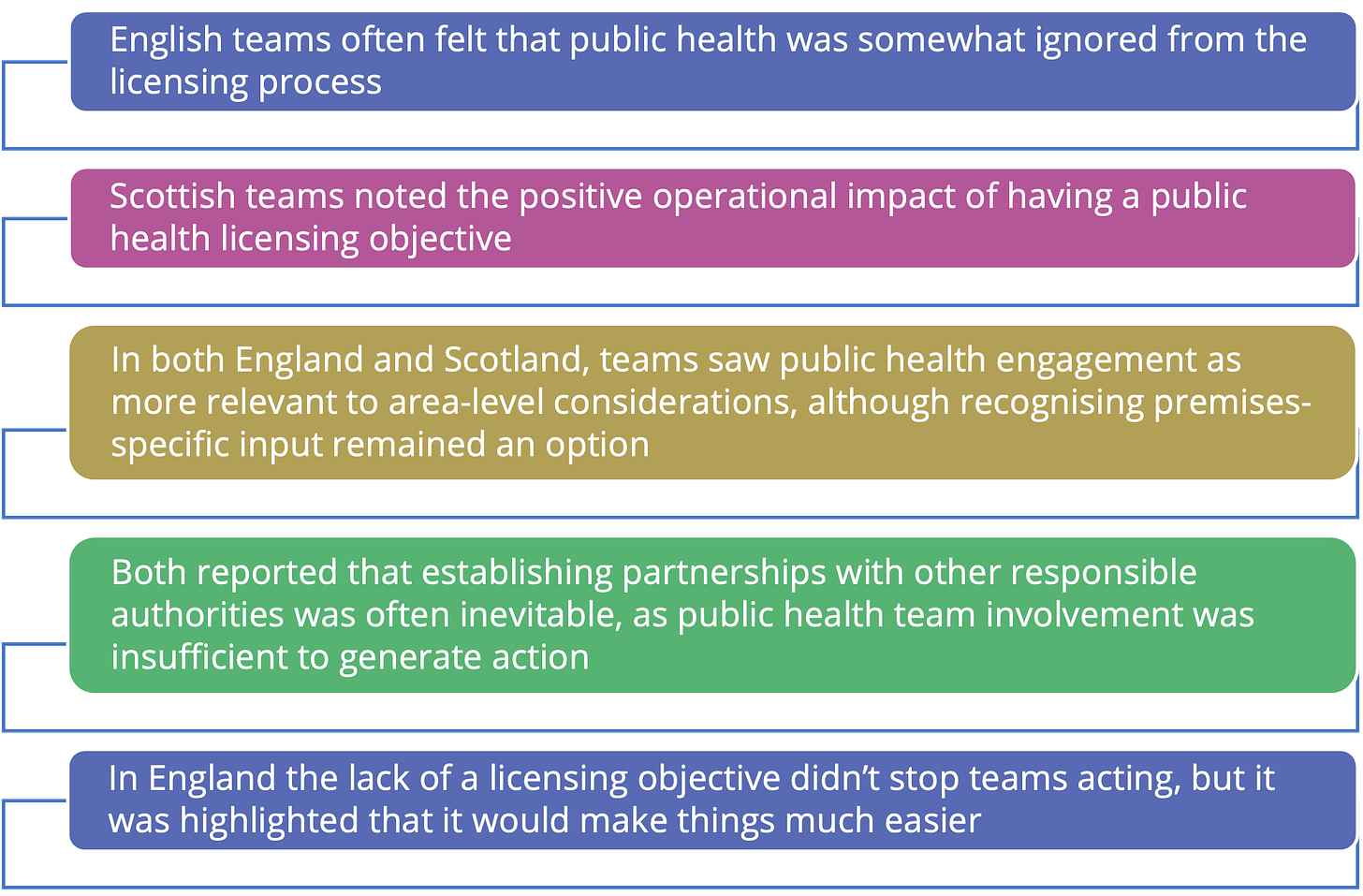
The authors of the study concluded that:
“In 2013, the reason given by the UK Government for not implementing its proposal to create a health-based licensing objective for cumulative impact assessment was that ‘more work is required at local level to put in processes to underpin it’.
“This research suggests that such work is underway, and that in areas where this has occurred, PHTs are keen for the UK Government to reconsider following Scotland in putting public health considerations on a statutory footing.”
New guidance for Scottish healthcare professionals on alcohol and cancer risks

Scottish health workers have been issued new guidance, published by Scottish Health Action on Alcohol Problems (SHAAP), highlighting the link between alcohol and cancer.
The guidance suggests that professionals can reduce alcohol-related cancer risks by supporting patients to reduce consumption. It also states that male drinkers are twice as likely to drink above the 14 unit guidelines a week as female drinkers.
SHAAP chairman Dr Alastair MacGilchrist said it provides a summary for healthcare professionals, as they “have an opportunity to inform their patients about the risks between alcohol and cancer and thereby reduce the risk that those patients will develop alcohol-related cancers and other alcohol harms”.
MacGilchrist went on to say:
“We are hopeful that this publication can act as a tool to help educate healthcare professionals, mitigate the risk of alcohol-attributable cancer, and support those with alcohol-related problems.”
Two thirds of heavy episodic drinkers in Ireland don’t recognise potential harm
A study by Ireland’s Health Research Board has found that two in three regular heavy episodic drinkers failed to recognise that their consumption was at higher risk levels, the Irish Mirror reported.
The report also found that almost half of drinkers in Ireland had a hazardous or harmful pattern of drinking, with 1 in 10 being alcohol dependent.
The report’s lead author Deirdre Mongan said the findings were concerning:
“The study highlights the need for more interventions and labelling on alcohol products to increase awareness of the harm it can cause.”
Mongan said they also showed that older people and those with lower educational attainment were less likely to be aware of their hazardous or harmful consumption of alcohol, while there is a cohort of younger drinkers who are aware of their dangerous drinking patterns.
In similar news, Alcohol Action Ireland (AAI) published its Market Review 2022 report, which found that the average Irish drinker consumed the equivalent of 235 cans of beer, or 444 cans per household, in 2021.
They also found that industry support from the State stood at €115 million over the last 10 years, through subsidies and preferential aid, and the cost of alcohol harm was €1.9 billion, or 11% of the total health budget.
AAI CEO Sheila Gilheany said:
“Our Review urges people, but in particular officeholders and policymakers, to reassess the reputation and obstructive nature of an industry who, aided by the State, relentlessly promotes its product.”
Drinking among teenagers continues to plateau
NHS Digital released a report on 06 September on Smoking, Drinking and Drug Use among Young People in England, 2021.
The report surveyed secondary school pupils regarding their use of these drugs, and found:
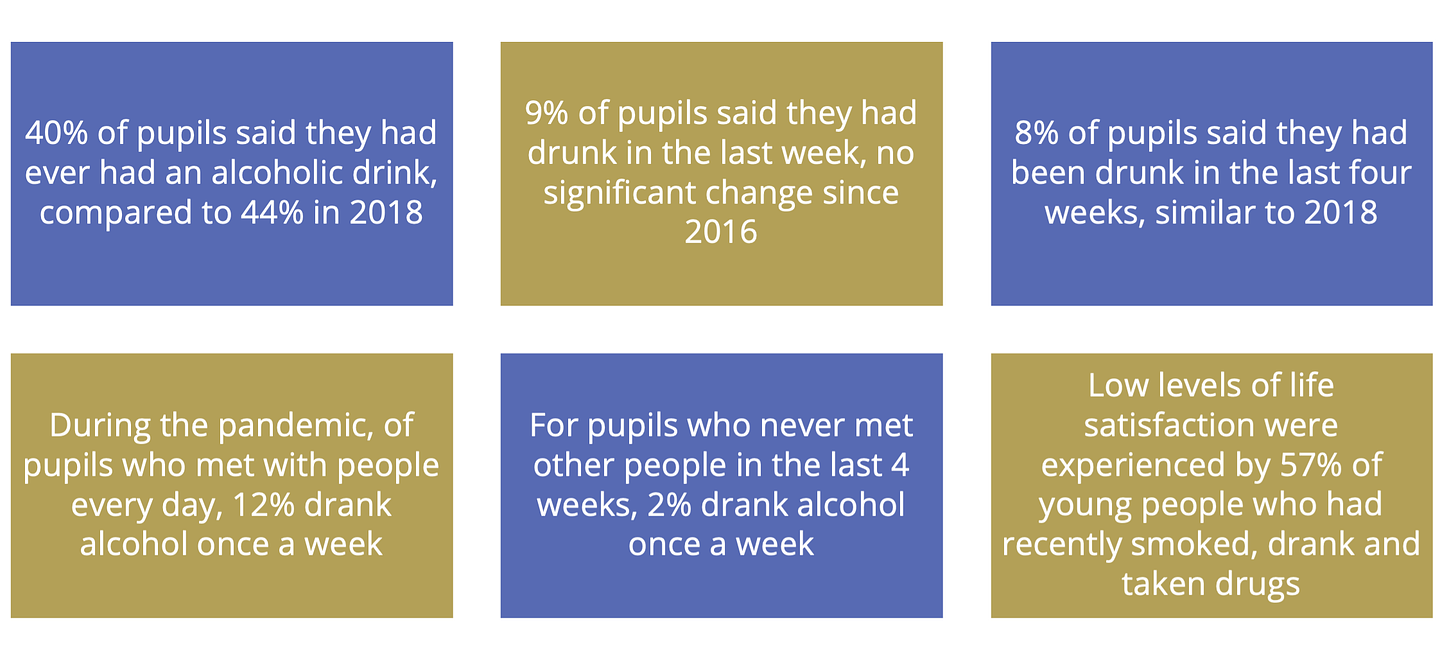
IAS’ Dr Alison Giles said:
“The report shows that pupils who live with drinkers, or are friends with people who drink, are far more likely to consume alcohol themselves. This normalisation of alcohol at such a young age is worrying. Alcohol marketing also feeds this normalisation: it often appeals to children, and is associated with alcohol use in this group.
“Social norms around drinking alcohol would be improved by independent regulation of alcohol marketing and restrictions to protect the health of children, instead of our current ineffective system where industry organisations are tasked with assessing the public’s complaints.”
Liz Truss could scrap the Obesity Strategy

Following Liz Truss’ replacement of Boris Johnson as Prime Minister, there have been a number of articles regarding her approach to public health.
On 13 September it was announced that the Government would be launching a review to assess the evidence around the UK’s obesity policy. The Guardian stated that this could “pave the way” for Liz Truss to scrap the Obesity Strategy. Once implemented, among other measures the Strategy would ban unhealthy products being displayed at checkouts and ban TV advertising of such products pre-watershed.
The article states that the Treasury review “is seen as part of the prime minister’s drive to cut burdens on business and help consumers through the cost of living crisis”, with a Whitehall source saying it is “deregulatory in focus”.
Officials at OHID are apparently “aghast” at the prospect and the Obesity Health Alliance said setting aside the government’s main weapons against obesity would be “a kick in the teeth”. The alliance’s director Katharine Jenner said:
“We are deeply concerned. It would be reckless to waste government and business time and money rowing back on these obesity policies, which are evidence-based and already in law. These policies are popular with the public, who want it to be easier to make healthier choices.”
The article quotes a source as saying that the new Health Secretary Thérèse Coffey doesn’t seem to have an appetite for “nanny state stuff”.
Conservative peer Lord Bethell said:
“Improving the nation’s health is one of the best ways we can increase productivity and workforce capacity and thereby drive growth. So I would be very surprised by any decisions that actually strive to make the UK less healthy.”
Previously Liz Truss has referred to public health activity – such as looking to improve eating habits and reduce alcohol consumption – as “neo-puritanism” and “finger wagging”, calling groups endeavouring to tackle obesity “an army of nannies and naysayers”.
Dr Gabriel Scally argued in the BMJ that this bodes poorly for the future and that an immediate goal should be to build understanding politically that the economy needs healthy workers and consumers, and a royal commission on public health is required to focus firmly on the long-term.
It has also been reported that one of Truss’ early moves could be to ignore the recommendations of the fan-led review of English football. One of the recommendations was to pilot allowing alcohol consumption in sight of the pitch in the National League and League Two, in order to improve their financial sustainability.
Should billboard advertising be banned?
On 08 September the BBC published an article that interviewed Charlotte Gage from campaign group Adfree Cities, who stated that billboard advertising should be banned.
Gage argued that these ads are placed without consultation, cause light pollution, and are for things people often cannot afford or don’t need. The campaign group wants a complete ban on all outdoor corporate advertising.
As the article explains, there is precedent for such bans. In March this year, Bristol City Council banned advertising for alcohol, junk food and gambling in the ad space that it owns. Norwich City Council are looking at doing the same.

Gage said that there are “ethical issues with junk food ads, pay day loans and high-carbon products, [and that] people would rather see community ads and art rather than have multi-billion dollar companies putting logos and images everywhere”.
Tim Lumb, Insights Director at the advertising trade body Outsmart, responded that:
“Adverts contribute a significant amount of money every year to the transport authorities and local councils through rent and business rates.
“In a free society, businesses have the right to advertise their wares, and individual citizens are not the helpless, brainless automatons that Adfree Cities considers them to be. Individuals make free and informed decisions about their spending choices, and pursue whatever they consider to be their ‘good life’.”
Dr Nathan Critchlow of Stirling University, whose work focuses on analysing marketing activity, said:
“There is consistent evidence that exposure to marketing for unhealthy commodities – for example advertising for alcohol or food and drinks high in fat, salt, or sugar – is associated with consumption, including among children and young people.”
Alcohol to be served at Qatar Football World Cup
“Select areas within stadiums” will serve alcohol at this year’s Football World Cup in Qatar, organisers have confirmed. Qatar is a Muslim country and the consumption of alcohol is prohibited in Islam.
Nasser Al Khater, CEO of the Qatar World Cup, said:
“We want people to come and have experiences they will never forget. We are incredibly excited to be welcoming the world to Qatar and the Middle East and Arab world. For many people it will be their first opportunity to see and explore the region. What we ask is that people, when they visit, stick to these designated areas.”
Fans at the stadiums will be able to drink within the stadium perimeter before kick-off and after the final whistle. Inside the stadium bowl itself only non-alcoholic beer and soft drinks will be sold.
Fans will also be able to buy alcohol at the FIFA fan festival in Doha’s Al Bidda Park after 18:30. Additional locations will be “communicated in due course”.
Alcohol Toolkit Study: update
The monthly data collected is from English households and began in March 2014. Each month involves a new representative sample of approximately 1,700 adults aged 16 and over.
See more data on the project website here.
Prevalence of increasing and higher risk drinking (AUDIT-C)
Increasing and higher risk drinking defined as those scoring >4 AUDIT-C. A-C1: Professional to clerical occupation C2-E: Manual occupation

Currently trying to restrict consumption
A-C1: Professional to clerical occupation C2-E: Manual occupation; Question: Are you currently trying to restrict your alcohol consumption e.g. by drinking less, choosing lower strength alcohol or using smaller glasses? Are you currently trying to restrict your alcohol consumption e.g. by drinking less, choosing lower strength alcohol or using smaller glasses?

Serious past-year attempts to cut down or stop
Question 1: How many attempts to restrict your alcohol consumption have you made in the last 12 months (e.g. by drinking less, choosing lower strength alcohol or using smaller glasses)? Please include all attempts you have made in the last 12 months, whether or not they were successful, AND any attempt that you are currently making. Q2: During your most recent attempt to restrict your alcohol consumption, was it a serious attempt to cut down on your drinking permanently? A-C1: Professional to clerical occupation C2-E: Manual occupation
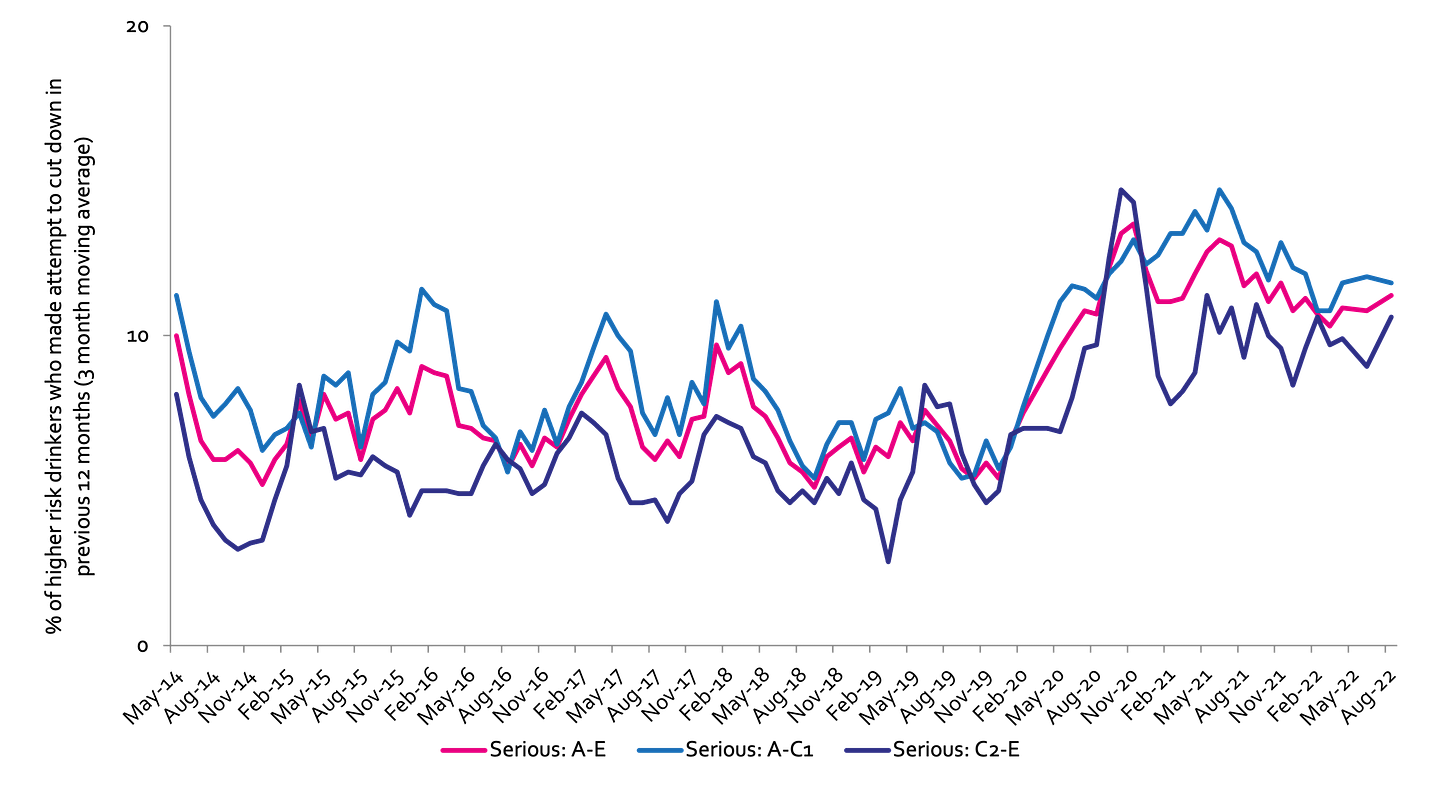
Podcast
Our monthly podcast features interviews with experts from across the sector.
Gambling industry harms and parallels with the alcohol world
Will Prochaska –
Coalition to End Gambling Ads

